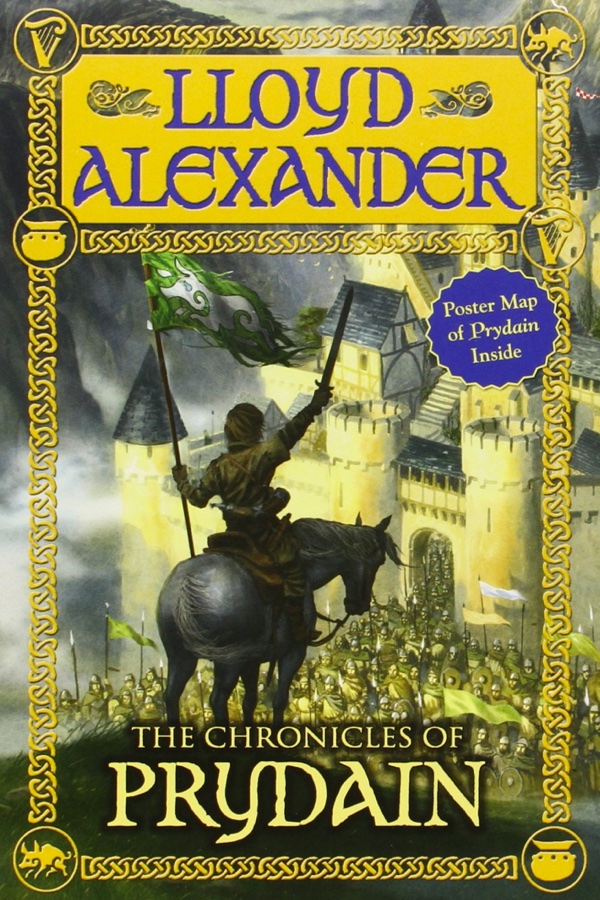The book market is flooded with a genre called “fantasy” which ranges from innocent adventure stories to the downright bizarre. Aside from The Lord of the Rings, The Chronicles of Narnia, and a few other titles, wholesome fantasy pickings can be slim. One you should add to your list is The Chronicles of Prydain by Lloyd Alexander.
Based on a combination of Welsh myth and Alexander’s imagination, this series of five books (including a Newberry Medal winner) and six short prequel tales is a great read for boys. The author seeks to share the beauty of Wales and its unique legends through an original children’s story set in the mythical world called Prydain. The story relates the coming of age of a boy named Taran, who yearns to be a great warrior hero but scorns common tasks like planting and blacksmithing. An orphan who does not know if his parents were of noble or common birth, Taran holds only the title ‘Assistant Pig-Keeper’. A runaway pig leads him to stumble headfirst into trouble, and his adventures begin.
Like any boy, Taran repeatedly grapples between virtue and vice. He displays both manly and childish traits, which interplay frequently as he struggles to better himself. The fact that he engages in this struggle with determination and perseverance shows that he is on the path to greatness. “The striving counts more than the gain,” as he himself discovers in the end. Taran’s case would be doubtful though, without his advisors – Dallben the wizard, Prince Gwydion the war leader, and Coll the warrior-turned-farmer – or his companions – Gurgi, the simple but fiercely loyal creature of the forest, Fflewddur Fflam, the king who prefers to be a wandering bard, Doli, the stubborn dwarf, and the Princess Eilonway, with whom he develops a predictable but nonetheless beautiful and wholesome romance. It is with these loyal friends that he confronts the almost insurmountable evil of Arawn the Death-Lord and his followers.
Taran proves to be a true friend and a quick, if sometimes forgetful, learner. He listens to wise counsel and makes great sacrifices for the benefit of others. By struggling to improve himself and putting others first, his life takes a course he never could have imagined. Throughout his many adventures, Taran learns that more important than success in battle or high birth is good tilled earth and work well-done. He is willing to fight when necessary while much preferring and treasuring the benefits of peace. In Taran’s own words, “everyman is a hero if he strives more for others than himself alone.”
Easier for younger readers to tackle than Tolkien’s Lord of the Rings or the even simpler Hobbit, The Prydain Chronicles serves as a good stepping stone to Tolkien’s epic tales. Note with caution though, there are some dark scenes and “scary” parts scattered throughout the books (such as undead warriors, prisoners burned alive mentioned in passing, and three eerie witches who serve as the Fates) which may trouble more sensitive young readers. However, these moments do not define the story nor set an overly dark tone. Hope prevails. Evil is clearly presented as evil and is consistently confronted by good. The chronicles are filled with adventure, humor, and growth in virtue along the path to manhood. Magic is used but more along the lines of Greek or Norse myth (as opposed to Harry Potter). The story takes place in a long past, pre-Christian age. The use of magic in the world of Prydain disappears at the end of the story as the world passes into a new age.
I recommend The Chronicles of Prydain for two reasons. First, I thoroughly enjoyed reading them and after reading these books once myself I listened to them in the car with my brothers (Heights students grades 3 and 6) who loved them. Good children’s literature can and should be enjoyed by readers of all ages. The engaging audiobooks help bring the many characters to life with incredible consistency. Second, I recommend them because of the solid example of growth in character and virtue. Taran learns to find joy and wonder in ordinary duties. This is a story defined by characters who are willing to struggle for the good even at the expense of personal glory, a worthy lesson especially for boys who aspire to greatness.



